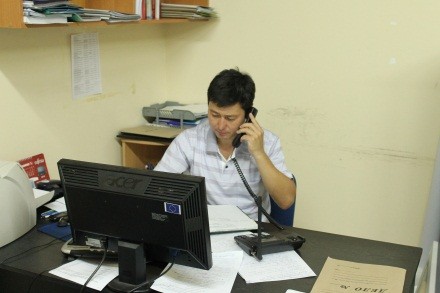
Kyrgyzstan's Adilet Legal Clinic is bringing justice to those who may not otherwise have recourse.
In July 2011, Zorakhan Rozieva, an ethnic Uzbek resident of Kara-Suu rayon in Osh oblast, won a court case against a local energy company that fined her 30,000 Kyrgyzstani Som (approximately $620) for non-payment of electricity. According to her lawyers, provided through local NGO Adilet, the company sent bills to Rozieva while she was out of town. Court hearings revealed that the company had issued bills without reading the meter.
In June 2012, a mother of a raped disabled daughter* from Jalalabad oblast submitted a claim to protect her child and punish the perpetrator. However, taking advantage of the girl’s inability to speak, the suspect claimed innocence. In November 2012, an Adilet lawyer won the case in a Jalalabad oblast court, which sentenced the rapist to eight years in prison.
These cases may not have ended in success without the Adilet Legal Clinic, an organization committed to promoting human rights and equal access to justice through free legal aid. It is currently implementing a 30-month-long “Equal Before the Law” project, which began in November 2011 and is funded by the Eurasia Foundation in Central Asia and the Finnish Ministry of Foreign Affairs. The project aims to align national law with international law, and improve best practices by increasing citizens' ability to defend their rights.
To complement these efforts, during 2012-2013, USAID’s Office of Transition Initiatives helped Adilet to expand its free legal aid hotline to the south and helped recruit two lawyers in Osh and Jalalabad cities to provide free phone consultations for citizens reporting human rights violations and discrimination against vulnerable groups. A television and radio campaign was launched to promote the service. In addition, based on an analysis of the calls, Adilet publicized the most pressing legal issues during eight press conferences in Bishkek. Legal issues included discrimination regarding electricity bills and access, civil issues related to property, and domestic violence.
“From May 2012 to February 2013, Adilet rendered 1,033 consultations on civil, administrative, and criminal cases on issues ranging from inaction of law enforcement agencies to compensations provided to victims of the June 2010 events,” said Ainura Osmonaliyeva, project coordinator at Adilet, referring to the country's revolution and ensuing violence several years ago.
Due to the large number of appeals that Adilet received during the outreach campaign, USAID extended its support of the hotline and the media campaign for four months to reach regions where the service was not widely known. This support also included helping Adilet with fundraising, marketing and sustainability, moving the organization closer to self-sufficiency and away from dependency on donor support.
*Names withheld at subjects’ request.







Comment
Make a general inquiry or suggest an improvement.